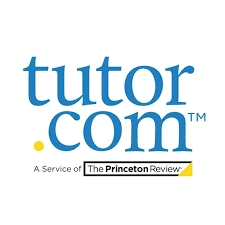Going the Extra Mile
Request a Library Speaker
Stories of Impact
Submit Your Story
Summer Break Story of Impact Form
Mobile Library Request Form
Display or Distribution of Materials Request
Interlibrary Loan Inquiry Form

Tutor.com Live Homework Help
NEW HOURS: 3pm-11pm - Get free homework help from a live, online, qualified tutor—up to 15 free tutoring sessions each week! All you need is a library card and an Internet connection. You can use tutor.com from home, school and even the Library. tutor.com is available for three different age groups:
Desplácese hacia abajo para ver la versión en español
- K-12 students can get help in English or Spanish in a wide range of subjects including math, science, English, social studies and essay review. NOTE: ONE Access students should enter your student ID number as your username and your birth year or birth month/day as your password (July 4 is 0704).
- College students can get help in English or Spanish for their college-level courses including English, science, math, social studies, and essay review. Tutors are also available to assist with GED preparation and career services such as resume review, job searching and interview preparation.
- Adult learners can get help in English and Spanish. Tutors are available for career help, including resume review, job searching and interview preparation. Tutors can also help with GED and Citizenship preparation, and essay review. Additionally, tutors can help adult learners with back to school needs.
- Nursing Students can get tutoring assistance with subjects like anatomy and physiology, microbiology, pathophysiology, pharmacology, psychology, medical/surgical nursing, nursing care plans and NCLEX test preparation.
Hours
- English and Spanish tutors available: daily from 3 p.m. to 11 p.m.
Closed: New Year's Day (January 1), Independence Day (July 4), Thanksgiving Day (November 26), and Christmas Day (December 25).
Obtenga ayuda con la tarea por parte de un tutor calificado en vivo, en línea – ¡con hasta 15 sesiones de tutoría gratuitas cada semana! Todo lo que necesita es una tarjeta de la biblioteca y una conexión a Internet. Puede usar tutor.com desde casa, la escuela e incluso la biblioteca. tutor.com está disponible para tres grupos de edades:
- Los estudiantes de K-12 pueden obtener ayuda en inglés o español en una amplia gama de materias que incluyen matemáticas, ciencias, inglés, estudios sociales y revisión de ensayos. AVISO: Los estudiantes con cuentas de ONE Access deben ingresar su número de identificación de estudiante como su nombre de usuario y su año de nacimiento de 4 dígitos como su contraseña.
- Los estudiantes universitarios pueden obtener ayuda en inglés o español para sus cursos de nivel universitario que incluyen inglés, ciencias, matemáticas, estudios sociales y revisión de ensayos. Los tutores también están disponibles para ayudar con la preparación para el GED y los servicios profesionales, como la revisión de su currículum, la búsqueda de empleo y la preparación para entrevistas.
- Los estudiantes adultos pueden obtener ayuda en inglés y español. Los tutores están disponibles para brindar ayuda profesional, incluyendo la revisión de su currículum, la búsqueda de empleo y la preparación para entrevistas. Los tutores también pueden ayudar con la preparación para el GED y el examen de la ciudadanía, y la revisión de ensayos. Además, los tutores pueden ayudar a los estudiantes adultos con preguntas relacionadas a retomar sus estudios.
- Los estudiantes de enfermería pueden obtener asistencia de tutoría con temas como anatomía y fisiología, microbiología, fisiopatología, farmacología, psicología, enfermería médica / quirúrgica, planes de atención de enfermería y preparación para los exámenes NCLEX.
Horario
- Tutoría en inglés y en español: todos los días a partir de las 3 p.m. hasta las 11 p.m.
Cerrado en los siguientes días festivos: Año Nuevo (1 de enero), Día de la Independencia (4 de julio), Día de Acción de Gracias (26 de noviembre) y Navidad (25 de diciembre).
